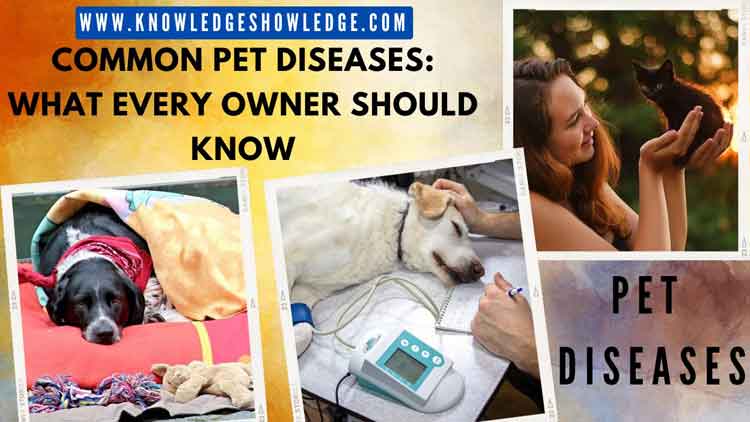Table of Contents
Common Pet Diseases: What Every Owner Should Know
Introduction
Pets are an integral part of our lives, offering unconditional love, companionship, and joy. However, as pet owners, it is our responsibility to ensure their health and well-being. Just like humans, pets can suffer from various diseases, some of which can be life-threatening if not detected and treated in time.
Whether you own a dog, cat, or any other pet, understanding common illnesses, their symptoms, and the best preventive measures can make all the difference in ensuring a long and healthy life for your furry friend.
This comprehensive guide will help pet owners recognize the warning signs of common pet diseases, understand their causes, and take the necessary steps for prevention and treatment. By being informed, you can provide your pet with the best possible care and enhance their quality of life.
Let’s dive into the most common pet diseases, their symptoms, prevention strategies, and the importance of veterinary care.
Understanding Pet Health and Disease Prevention
Preventing diseases in pets requires proper nutrition, regular veterinary check-ups, and a clean environment. Ensuring vaccinations and parasite control can significantly reduce the risk of common illnesses.
Top Dog Diseases and Practical Preventive Measures Every Pet Parent Should Know
Common Diseases in Dogs
Dogs can suffer from various health conditions, some of which are preventable with proper care.
a) Canine Parvovirus (Parvo)
- Symptoms: Vomiting, diarrhea (often bloody), fever, lethargy.
- Prevention: Vaccination, hygiene, and avoiding contact with infected dogs.
b) Canine Distemper
- Symptoms: Coughing, nasal discharge, fever, seizures.
- Prevention: Regular vaccinations and limiting exposure to infected animals.
c) Heartworm Disease
- Symptoms: Coughing, difficulty breathing, weight loss.
- Prevention: Monthly preventive medication and mosquito control.
d) Kennel Cough
- Symptoms: Dry hacking cough, nasal discharge, loss of appetite.
- Prevention: Vaccination, maintaining hygiene in dog shelters.
e) Arthritis in Dogs
- Symptoms: Stiffness, limping, difficulty standing up.
- Prevention: Proper weight management, joint supplements, and moderate exercise.
Taking Your Pet with You | Best Tips on Pets

Common Diseases in Cats
Cats also suffer from several infectious and chronic diseases.
a) Feline Leukemia Virus (FeLV)
- Symptoms: Weight loss, fever, loss of appetite, persistent infections.
- Prevention: Vaccination and avoiding contact with infected cats.
b) Feline Immunodeficiency Virus (FIV)
- Symptoms: Weak immune system, frequent infections, swollen lymph nodes.
- Prevention: Keeping cats indoors, regular vet check-ups.
c) Feline Panleukopenia (Feline Distemper)
- Symptoms: Lethargy, vomiting, severe diarrhea.
- Prevention: Vaccination and sanitation.
d) Upper Respiratory Infections
- Symptoms: Sneezing, nasal discharge, fever.
- Prevention: Clean living conditions, vaccination.
e) Kidney Disease in Cats
- Symptoms: Increased thirst, frequent urination, weight loss.
- Prevention: Hydration, balanced diet, regular vet visits.
How to Look After Your Pet | Best Way to Take Care of Your Pet
Zoonotic Diseases: Diseases That Can Spread from Pets to Humans
Some pet diseases can be transmitted to humans, making preventive care essential.
a) Rabies
- Symptoms: Behavioral changes, paralysis, excessive drooling.
- Prevention: Vaccination, avoiding contact with wild animals.
b) Ringworm
- Symptoms: Circular patches of hair loss, red skin lesions.
- Prevention: Good hygiene, prompt veterinary treatment.
c) Toxoplasmosis
- Symptoms in Humans: Flu-like symptoms, muscle pain.
- Prevention: Proper handling of cat litter, washing hands thoroughly.
Parasites and Their Effect on Pet Health
Parasites can cause severe health issues in pets and need to be controlled effectively.
a) Fleas
- Symptoms: Excessive scratching, red skin, hair loss.
- Prevention: Regular flea treatments, grooming.
b) Ticks
- Symptoms: Skin irritation, anemia, Lyme disease.
- Prevention: Tick collars, checking pets regularly.
c) Intestinal Worms
- Symptoms: Vomiting, diarrhea, bloated stomach.
- Prevention: Regular deworming, hygiene maintenance.
The Best Dog Food: What to Look For and Why It Matters?

Importance of Vaccination for Pets
Vaccinations are crucial for preventing several serious diseases in pets.
- Core vaccines for dogs: Rabies, Distemper, Parvovirus.
- Core vaccines for cats: Rabies, Feline Leukemia, Panleukopenia.
- Follow the vaccination schedule recommended by your vet.
How to Recognize Signs of Illness in Pets
Identifying early signs of illness can save your pet’s life.
- Behavioral Changes: Lethargy, hiding, aggression.
- Appetite Changes: Sudden weight loss or gain.
- Gastrointestinal Issues: Vomiting, diarrhea.
- Respiratory Symptoms: Coughing, wheezing, nasal discharge.
- Skin and Coat Problems: Hair loss, itching, redness.
Interesting Facts About Dogs | The Best Pet Animal – Dog
First Aid for Common Pet Emergencies
Knowing basic first aid can be lifesaving.
- Bleeding Wounds: Apply pressure with a clean cloth.
- Choking: Try to remove the object if visible.
- Heatstroke: Move pet to a cool place, offer water.
- Seizures: Keep the pet away from dangerous objects, time the seizure.
Preventive Measures for Pet Health
Prevention is always better than cure when it comes to pet diseases.
- Regular vet check-ups and vaccinations.
- Healthy diet and exercise.
- Parasite control through regular treatments.
- Clean living environment.
- Monitoring for early symptoms.
Do You Have an Allergy to Your Pet? | Best of Pets

Conclusion: Prioritizing Your Pet’s Health
Your pet’s health and happiness depend on your vigilance and care. By understanding common pet diseases, their symptoms, and preventive measures, you can ensure a long, joyful life for your furry companion. Regular vet visits, a nutritious diet, and a clean environment are essential for their well-being.
A proactive approach to pet healthcare not only prevents costly treatments but also strengthens the bond between you and your pet. Stay informed, act early, and provide the love and attention your pet deserves. With the right care, your pet can lead a healthy and fulfilling life!
How to Deal with Mosquitos at Home | Home Mosquito Repellant
Final Tips: Common Pet Diseases
- Schedule routine vet visits.
- Maintain a healthy diet and exercise routine.
- Keep up with parasite prevention.
- Watch for early signs of illness and act promptly.
Ensuring your pet’s health is a commitment, but with proper care, you can enjoy many happy years together!
